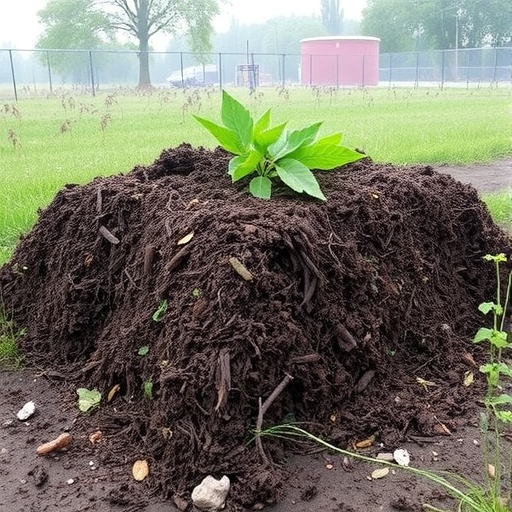In a groundbreaking study carried out at the University of Córdoba (UCO), researchers have unveiled how the storage duration of alperujo, the principal by-product of olive oil production, profoundly impacts the efficiency and environmental footprint of its subsequent composting process. This investigation breaks new ground by integrating metagenomic analysis with comprehensive assessments of greenhouse gas emissions, providing an unprecedented insight into the transformation of this challenging agro-industrial residue into a viable organic fertilizer.
Alperujo is notorious for its environmental persistence due to its complex organic constituents and high phenolic compound content, which pose significant risks to soil and aquatic ecosystems if improperly managed. Its dual characteristic as both a pollutant and a resource makes understanding its composting behavior crucial, particularly within the framework of circular economy practices where waste is valorized into useful products. The research focuses on optimizing the composting of alperujo by revealing how the pre-treatment storage affects compost quality and ecological impact.
The multidisciplinary collaboration between the Molecular Biology of Stress Response Mechanisms and Waste Bioengineering groups at UCO endeavored to assess the influence of two discrete alperujo storage intervals — three and six months — on composting performance metrics. These included compost yield, the emission profiles of greenhouse gases such as methane (CH4) and carbon dioxide (CO2), degradation efficiency of phenolic compounds, and changes in the microbial consortia responsible for organic matter breakdown.
Intriguingly, the study demonstrated that shorter alperujo storage, exemplified by the three-month period, not only enhanced the total compost yield but also minimized the emission of greenhouse gases during the thermophilic phase of composting. This discovery suggests that the physicochemical characteristics of fresher alperujo facilitate more effective microbial degradation while curbing environmental pollutants. Such outcomes have direct implications for improving sustainable agricultural practices and regulatory management of olive oil industry residues.
The phenolic compounds, which are phytotoxic and pose a threat to soil health, were found to be effectively eliminated during composting regardless of storage time. This removal primarily results from the high-temperature thermophilic stage, where temperatures exceed 55°C, accelerating the breakdown and volatilization of these complex organics. The sanitization effect of this thermal phase not only detoxifies the compost but also ensures that the final fertilizer product is safe for application in agricultural lands.
Central to this pioneering research was the use of functional metagenomics to profile the bacterial communities throughout the composting cycle. The team uncovered pronounced differences in microbial diversity associated with the initial storage durations of alperujo, which carried over into distinct successional patterns during composting. These findings shed light on how initial substrate characteristics govern microbial ecology, with thermophilic bacteria taking dominance during high-temperature phases to drive organic decomposition.
Metagenomic sequencing revealed a selective enrichment of thermotolerant taxa competent at degrading lignocellulosic and phenolic substrates, which are critical for efficient conversion of complex waste materials into stable humus. The identification of these microbial players provides an avenue for strategic inoculation approaches, where specific microbial strains could be introduced to optimize the degradation pathways, improve compost quality, and further reduce emissions.
Moreover, the study provides foundational knowledge to tailor composting protocols by adjusting storage times to modulate microbial functions and biochemical transformations. For instance, knowing which microbial taxa favor the breakdown of detrimental compounds enables the fine-tuning of conditions to mitigate residual phytotoxins. This level of control can boost fertilizer performance and environmental safety, advancing alperujo composting practices to a new level of precision and sustainability.
The research not only addresses the direct environmental consequences related to the handling of olive-oil waste but also intersects with the larger global imperative of greenhouse gas mitigation from agricultural sources. By linking storage strategies with emission outcomes, this work signals a practical lever to reduce the carbon footprint of organic fertilizer production—a critical step towards climate-smart agriculture.
From an applied perspective, the elucidation of storage-dependent metabolic and microbial dynamics opens the door for industrial stakeholders to optimize their waste management systems. It allows olive oil producers to make informed decisions on storage duration that balance operational demands with ecological and productivity goals, minimizing waste and maximizing resource recovery.
This study stands out for its methodological integration encompassing on-site real-scale experiments, gas emission quantification, chemical analyses of organic compounds, and cutting-edge bioinformatics to decode microbial communities. Through this comprehensive approach, the research crafts a nuanced narrative on how temporally governed processes in waste storage influence downstream bioconversion outcomes.
In sum, the University of Córdoba’s investigation offers vital insights for agro-industry professionals, environmental scientists, and policy-makers aiming to harness the potential of alperujo within circular bioeconomy frameworks. By highlighting the interplay between storage duration, microbial ecology, gaseous emissions, and compost quality, it paves the way for sustainable valorization strategies of olive oil by-products that align ecological stewardship with economic benefit.
Ultimately, these revelations emphasize the importance of considering temporal variables and microbial ecosystem functions when designing and managing composting systems for organic residues. They represent significant progress in transforming a problematic waste into an environmentally friendly fertilizer, closing the loop for olive oil production and contributing to sustainable agriculture worldwide.
Subject of Research: Not applicable
Article Title: Storage of Alperujo influences composting performance: Insights into gaseous emissions and functional metagenomics
News Publication Date: 25-Aug-2025
Web References:
https://www.sciencedirect.com/science/article/pii/S0301479725029913
References:
Ruiz-Castilla FJ, Barbudo-Lunar M, Gutiérrez MC, Michán C, Martín MÁ, Alhama J. Storage of Alperujo influences composting performance: Insights into gaseous emissions and functional metagenomics. J Environ Manage. 2025 Aug 25;393:127015. doi: 10.1016/j.jenvman.2025.127015
Image Credits: University of Córdoba
Keywords: Agricultural chemistry, Soil pollution, Water pollution




